医学英语口语的情景对话(精选)
医务人员对话中英文
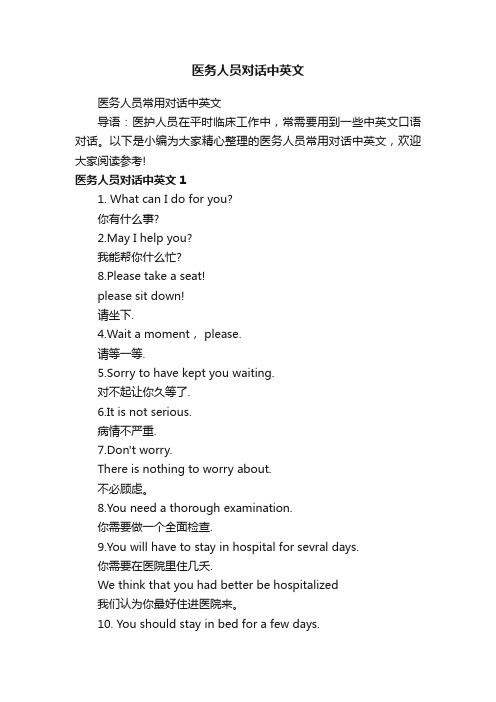
医务人员对话中英文医务人员常用对话中英文导语:医护人员在平时临床工作中,常需要用到一些中英文口语对话。
以下是小编为大家精心整理的医务人员常用对话中英文,欢迎大家阅读参考!医务人员对话中英文11. What can I do for you?你有什么事?2.May I help you?我能帮你什么忙?8.Please take a seat!please sit down!请坐下.4.Wait a moment, please.请等一等.5.Sorry to have kept you waiting.对不起让你久等了.6.It is not serious.病情不严重.7.Don't worry.There is nothing to worry about.不必顾虑。
8.You need a thorough examination.你需要做一个全面检查.9.You will have to stay in hospital for sevral days.你需要在医院里住几夭.We think that you had better be hospitalized我们认为你最好住进医院来。
10. You should stay in bed for a few days.你需要卧床几天.11. You can keep on working.You can carry on with your work.可以继续工作。
12. You should be very careful for a week or two这一两周内,你需要很注意。
13. Try to relax and keep calm.尽量放松保持镇静。
14. You'll soon be all right.你很快就会好起来的.15. 1'm sure this medicine will help you a great deal.这药对你肯定会很有效的.16. Feeling well again is a rather slow process,I'm afraid.恐怕痊愈将是一个很慢的过程.17. You will have to wait for twenty minutes.你需要等20分钟.plete recovery will take a rather long time.彻底恢复需要一段很长的时间。
医学英语会话

对话一:医生:早上好,有什么我可以帮助您吗?患者:您好,医生。
我最近总是感觉头疼,还有咳嗽和流鼻涕的症状。
您看我是不是需要去看一下医生?医生:听起来像是感冒的症状。
请问您有没有发烧或者呼吸困难的情况?患者:没有发烧,但有时会觉得呼吸有点困难。
医生:好的,我会给您开一些治疗感冒的药物,同时建议您多喝水、多休息。
如果症状持续加重或者出现其他症状,请及时来医院就诊。
对话二:医生:你好,请问你有什么问题需要咨询?患者:我前几天做了手术,现在感觉伤口有点疼痛,而且感觉伤口周围的皮肤有点发红。
您看这是正常的吗?医生:您的情况可能是术后感染或者炎症的表现。
我建议您及时到医院进行检查和治疗。
同时,保持伤口清洁干燥,避免剧烈运动和过度劳累。
对话三:护士:您好,请问您是XXX先生吗?患者:是的,我是XXX。
请问您有什么事吗?护士:您的血液检查结果出来了,我给您送过来了。
您需要看一下吗?患者:好的,谢谢。
麻烦您了。
护士:不客气,有问题请随时联系我。
患者:(打开检查结果)啊,我的血糖有点高啊。
我需要采取什么措施吗?护士:是的,您需要控制饮食和增加运动量,同时需要定期监测血糖。
如果症状持续加重或者出现其他不适症状,请及时就医。
对话四:医生:你好,我想请问一下如何预防慢性病的发生?患者:保持健康的生活方式是很重要的,比如少吃油腻的食物、多运动、戒烟限酒等。
此外,定期体检也非常重要,可以及时发现和治疗疾病。
医生:非常好,保持健康的生活方式可以预防许多疾病的发生。
谢谢您的建议。
总结:以上是几个医学英语会话的例子,涵盖了感冒、手术恢复、检查结果和慢性病预防等方面。
在医学英语会话中,需要注意专业术语的使用和表达方式的准确性,同时也要注意礼貌和尊重。
通过不断学习和实践,可以提高自己的医学英语会话能力。
生病就医情景对话范文英语

生病就医情景对话范文英语Doctor: Hello, how can I help you today?Patient: I'm not feeling well. I have a headache, asore throat, and a runny nose.Doctor: When did your symptoms start?Patient: They started yesterday.Doctor: Have you taken any medication for your symptoms? Patient: No, I haven't.Doctor: I'm going to listen to your lungs and checkyour throat.(The doctor listens to the patient's lungs and checks their throat.)。
Doctor: Your lungs sound clear, but your throat is a little red and swollen. I'm going to prescribe you some antibiotics for your sore throat and some pain relievers for your headache.Patient: Thank you.Doctor: You're welcome. I also recommend that you get plenty of rest and drink plenty of fluids.Patient: I will.Doctor: If your symptoms don't improve in a few days, or if they get worse, please come back and see me.Patient: I will. Thank you again.Doctor: You're welcome.Additional Questions the Doctor May Ask:What is the severity of your symptoms?Have you had any other symptoms, such as fever, cough, or nausea?Do you have any underlying health conditions?Are you taking any medications?Do you have any allergies?Have you recently traveled?Have you been in contact with anyone who is sick?Additional Information the Patient May Provide:The duration of their symptoms.The severity of their symptoms.Any other symptoms they are experiencing.Any underlying health conditions they have.Any medications they are taking.Any allergies they have.Any recent travel they have done.Any contact they have had with anyone who is sick.Tips for Communicating with Your Doctor:Be clear and concise when describing your symptoms.Answer the doctor's questions honestly and completely. Ask questions if you don't understand something.Follow the doctor's instructions carefully.If your symptoms don't improve or get worse, don't hesitate to contact your doctor.。
常用医学英语口语对话
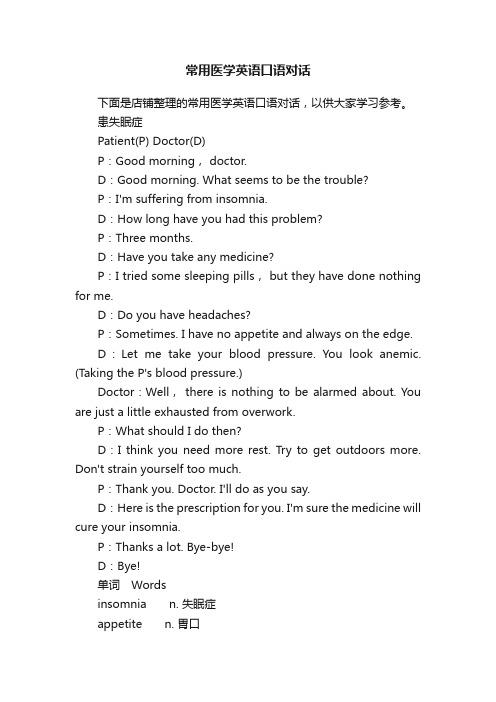
常用医学英语口语对话下面是店铺整理的常用医学英语口语对话,以供大家学习参考。
患失眠症Patient(P) Doctor(D)P:Good morning, doctor.D:Good morning. What seems to be the trouble?P:I'm suffering from insomnia.D:How long have you had this problem?P:Three months.D:Have you take any medicine?P:I tried some sleeping pills, but they have done nothing for me.D:Do you have headaches?P:Sometimes. I have no appetite and always on the edge.D:Let me take your blood pressure. You look anemic. (Taking the P's blood pressure.)Doctor:Well,there is nothing to be alarmed about. You are just a little exhausted from overwork.P:What should I do then?D:I think you need more rest. Try to get outdoors more. Don't strain yourself too much.P:Thank you. Doctor. I'll do as you say.D:Here is the prescription for you. I'm sure the medicine will cure your insomnia.P:Thanks a lot. Bye-bye!D:Bye!单词Wordsinsomnia n. 失眠症appetite n. 胃口pressure n. 压力,血压anemic n. 贫血病exhausted adj 疲倦,筋疲力尽overwork n. 过度劳累outdoors adv 户外cure n. vt 治愈,治好短语Phrasessuffer from 遭受sleeping pills 安眠药on the edge 紧张不安take sb's blood pressure 量血压句子Sentence PatternsWhat seems to be the trouble?哪里不舒服?How long have you had this problem?这种情况有多久了?I tried some sleeping pills, but they have done nothing for me.我试过安眠药,但是对我一点儿都不起作用。
医院常用的简单英语口语对话
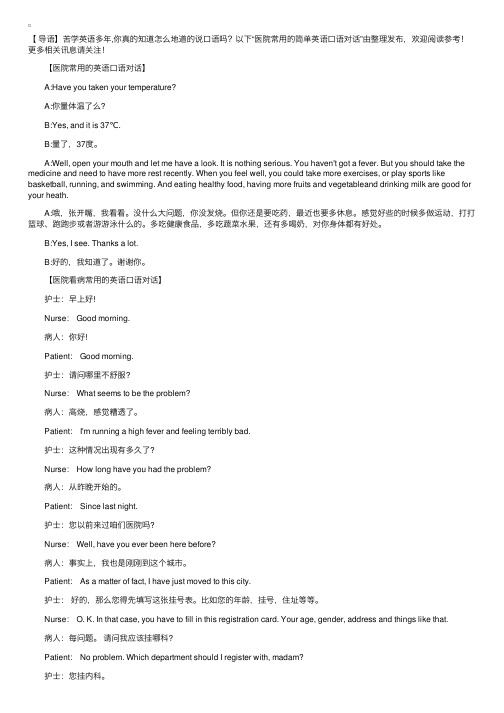
【导语】苦学英语多年,你真的知道怎么地道的说⼝语吗?以下“医院常⽤的简单英语⼝语对话”由整理发布,欢迎阅读参考!更多相关讯息请关注! 【医院常⽤的英语⼝语对话】 A:Have you taken your temperature? A:你量体温了么? B:Yes, and it is 37℃. B:量了,37度。
A:Well, open your mouth and let me have a look. It is nothing serious. You haven't got a fever. But you should take the medicine and need to have more rest recently. When you feel well, you could take more exercises, or play sports like basketball, running, and swimming. And eating healthy food, having more fruits and vegetableand drinking milk are good for your heath. A:哦,张开嘴,我看看。
没什么⼤问题,你没发烧。
但你还是要吃药,最近也要多休息。
感觉好些的时候多做运动,打打篮球、跑跑步或者游游泳什么的。
多吃健康⾷品,多吃蔬菜⽔果,还有多喝奶,对你⾝体都有好处。
B:Yes, I see. Thanks a lot. B:好的,我知道了。
谢谢你。
【医院看病常⽤的英语⼝语对话】 护⼠:早上好! Nurse: Good morning. 病⼈:你好! Patient: Good morning. 护⼠:请问哪⾥不舒服? Nurse: What seems to be the problem? 病⼈:⾼烧,感觉糟透了。
医疗情景会话,英文
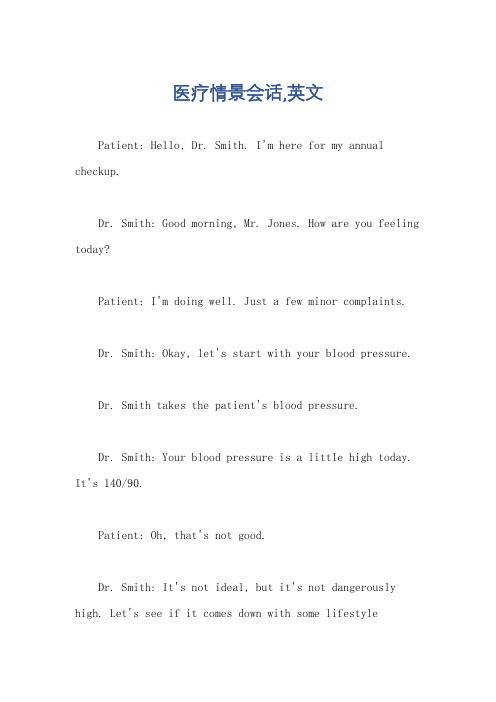
医疗情景会话,英文Patient: Hello, Dr. Smith. I'm here for my annual checkup.Dr. Smith: Good morning, Mr. Jones. How are you feeling today?Patient: I'm doing well. Just a few minor complaints.Dr. Smith: Okay, let's start with your blood pressure.Dr. Smith takes the patient's blood pressure.Dr. Smith: Your blood pressure is a little high today. It's 140/90.Patient: Oh, that's not good.Dr. Smith: It's not ideal, but it's not dangerously high. Let's see if it comes down with some lifestylechanges. I'm going to prescribe you a low-dose blood pressure medication.Patient: Okay.Dr. Smith: I also want to check your cholesterol levels.Dr. Smith draws blood from the patient's arm.Dr. Smith: Your cholesterol levels are also a little high. Your total cholesterol is 220.Patient: That's not good either.Dr. Smith: It's not ideal, but it's not dangerously high. Let's see if it comes down with some lifestyle changes. I'm going to prescribe you a statin medication.Patient: Okay.Dr. Smith: I also want to talk to you about your weight. You're currently overweight.Patient: I know. I've been trying to lose weight, butit's hard.Dr. Smith: I understand. Losing weight can be difficult. But it's important to do so for your health. Being overweight can increase your risk of heart disease, stroke, and other health problems.Patient: I know.Dr. Smith: I'm going to give you some tips on how to lose weight. And I'm going to refer you to a registered dietitian who can help you create a personalized weightloss plan.Patient: Thank you.Dr. Smith: You're welcome. I also want to check your prostate.Dr. Smith performs a digital rectal exam.Dr. Smith: Your prostate is slightly enlarged, but it's not cancerous.Patient: That's a relief.Dr. Smith: I'm going to prescribe you a medication to shrink your prostate.Patient: Okay.Dr. Smith: I also want to talk to you about your smoking.Patient: I know. I need to quit.Dr. Smith: Quitting smoking is one of the best things you can do for your health. It will reduce your risk of heart disease, stroke, and other health problems.Patient: I know.Dr. Smith: I'm going to give you some tips on how to quit smoking. And I'm going to refer you to a smoking cessation counselor who can help you.Patient: Thank you.Dr. Smith: You're welcome. Well, that's all for today. I'll see you back in six months for your next checkup.Patient: Thank you, Dr. Smith.Dr. Smith: You're welcome.。
医护英语口语情景对话
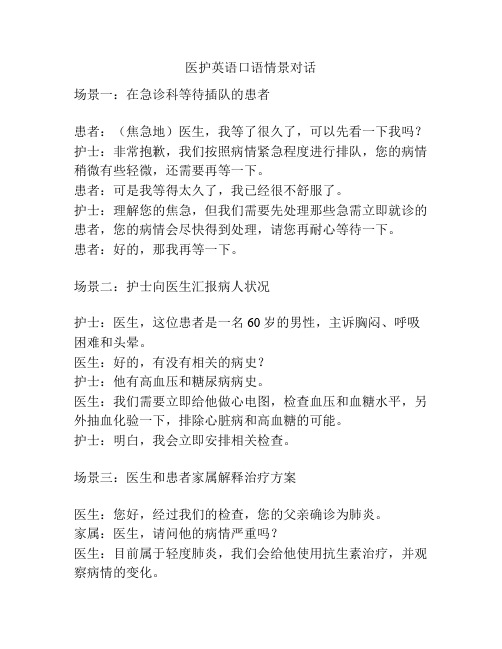
医护英语口语情景对话
场景一:在急诊科等待插队的患者
患者:(焦急地)医生,我等了很久了,可以先看一下我吗?护士:非常抱歉,我们按照病情紧急程度进行排队,您的病情稍微有些轻微,还需要再等一下。
患者:可是我等得太久了,我已经很不舒服了。
护士:理解您的焦急,但我们需要先处理那些急需立即就诊的患者,您的病情会尽快得到处理,请您再耐心等待一下。
患者:好的,那我再等一下。
场景二:护士向医生汇报病人状况
护士:医生,这位患者是一名60岁的男性,主诉胸闷、呼吸困难和头晕。
医生:好的,有没有相关的病史?
护士:他有高血压和糖尿病病史。
医生:我们需要立即给他做心电图,检查血压和血糖水平,另外抽血化验一下,排除心脏病和高血糖的可能。
护士:明白,我会立即安排相关检查。
场景三:医生和患者家属解释治疗方案
医生:您好,经过我们的检查,您的父亲确诊为肺炎。
家属:医生,请问他的病情严重吗?
医生:目前属于轻度肺炎,我们会给他使用抗生素治疗,并观察病情的变化。
家属:需要住院吗?
医生:考虑到他的病情和年龄,我们建议他住院观察,确保及时处理任何可能的并发症。
家属:好的,谢谢医生。
场景四:医生向护士交接病人情况
医生:护士,这位患者病情已经稳定,可以转到一般病房继续观察和治疗。
护士:明白,我会协助安排病房转移和医嘱的整理。
医生:另外,他还需要每日监测体温、血压和心率,记得及时记录并报告异常情况。
护士:好的,我会密切关注他的生命体征,并及时向您汇报。
医疗英语口语 日常英语口语100句
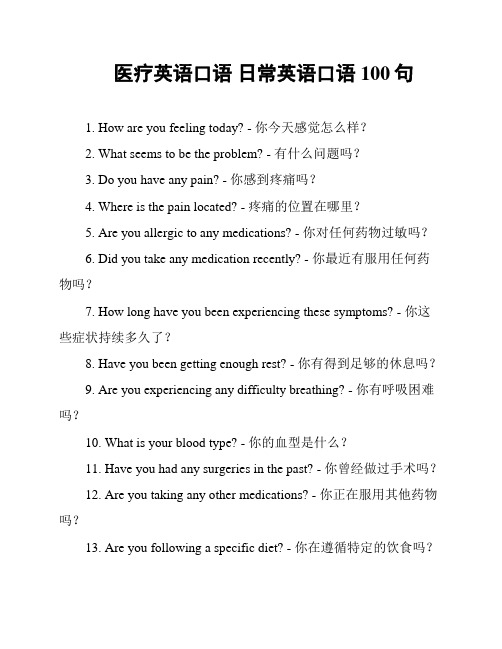
医疗英语口语日常英语口语100句1. How are you feeling today? - 你今天感觉怎么样?2. What seems to be the problem? - 有什么问题吗?3. Do you have any pain? - 你感到疼痛吗?4. Where is the pain located? - 疼痛的位置在哪里?5. Are you allergic to any medications? - 你对任何药物过敏吗?6. Did you take any medication recently? - 你最近有服用任何药物吗?7. How long have you been experiencing these symptoms? - 你这些症状持续多久了?8. Have you been getting enough rest? - 你有得到足够的休息吗?9. Are you experiencing any difficulty breathing? - 你有呼吸困难吗?10. What is your blood type? - 你的血型是什么?11. Have you had any surgeries in the past? - 你曾经做过手术吗?12. Are you taking any other medications? - 你正在服用其他药物吗?13. Are you following a specific diet? - 你在遵循特定的饮食吗?14. Have you been feeling dizzy or lightheaded? - 你感到头晕或头昏吗?15. Can you describe your symptoms in detail? - 你能详细描述你的症状吗?16. Do you have a family history of any medical conditions? - 你的家族中有任何医学状况吗?17. Are you sexually active? - 你有性生活吗?18. Have you been tested for any sexually transmitted infections? - 你曾经接受过任何性传播感染的测试吗?19. When was your last menstrual period? - 你上次月经是什么时候?20. How often do you exercise? - 你多久锻炼一次?21. Are you experiencing any changes in your appetite? - 你的食欲有任何变化吗?22. Are you experiencing any changes in your weight? - 你的体重有任何变化吗?23. Are you experiencing any changes in your sleep patterns? - 你的睡眠模式有任何变化吗?24. Are you experiencing any changes in your vision? - 你的视力有任何变化吗?25. Have you been feeling depressed or anxious? - 你感到抑郁或焦虑吗?26. Do you smoke or drink alcohol? - 你抽烟或喝酒吗?27. Are you currently taking any supplements or herbal remedies? - 你目前正在服用任何补品或草药吗?28. How often do you consume caffeine? - 你多久摄入一次咖啡因?29. Have you been experiencing any urinary problems? - 你有任何尿液方面的问题吗?30. Are you experiencing any changes in your bowel movements? - 你的排便有任何变化吗?31. Are you sexually active and not using contraception? - 你正在有性生活并且不使用避孕措施吗?32. Do you have any history of sexually transmitted infections? - 你有任何性传播感染的病史吗?33. Have you recently traveled to any foreign countries? - 最近你有去过其他国家吗?34. Have you been in contact with anyone who has been sick? - 你与任何生病的人接触过吗?35. Do you live or work in an environment with potential health hazards? - 你生活或工作的环境可能有健康隐患吗?36. Have you been exposed to any chemicals or toxins? - 你接触到任何化学物质或毒素吗?37. Do you have any known allergies? - 你有任何已知的过敏吗?38. Have you had any recent X-rays or other medical imaging? - 你最近有过X光或其他医学影像吗?39. Are you experiencing any chest pains or tightness? - 你有胸痛或紧迫感吗?40. Are you experiencing any difficulty swallowing? - 你有吞咽困难吗?41. Have you had any recent injuries or accidents? - 你最近有过任何伤害或事故吗?42. Have you experienced any loss of consciousness or seizures? - 你有过任何失去意识或痉挛的经历吗?43. Are you experiencing any changes in your hearing? - 你的听力有任何变化吗?44. Are you experiencing any changes in your sense of taste or smell? - 你的味觉或嗅觉有任何变化吗?45. Have you had any recent blood tests? - 你最近有过任何血液测试吗?46. Are you currently pregnant or trying to conceive? - 你目前怀孕或试图怀孕吗?47. Are you experiencing any changes in your menstrual cycle? - 你的月经周期有任何变化吗?48. When was your last pap smear or gynecological examination? - 你最近进行了宫颈抹片或妇科检查吗?49. Do you have any concerns about your sexual health? - 你对你的性健康有任何担忧吗?50. Are you experiencing any changes in your mood or emotions? - 你的情绪或情感有任何变化吗?51. Do you have a history of mental health disorders? - 你有心理健康障碍的病史吗?52. Have you been experiencing any memory problems? - 你有任何记忆问题吗?53. Are you experiencing any changes in your coordination or balance? - 你的协调或平衡有任何变化吗?54. Have you had any recent falls or accidents? - 你最近有过任何跌倒或事故吗?55. Are you experiencing any numbness or tingling sensations? - 你有任何麻木或刺痛感吗?56. Do you have any family history of neurological disorders? - 你有任何神经系统疾病的家族史吗?57. Are you experiencing any difficulty with speaking or understanding language? - 你有语言表达或理解上的困难吗?58. Have you had any recent head injuries? - 你最近有过任何头部受伤吗?59. Do you have any dental concerns? - 你有任何牙齿方面的顾虑吗?60. Are you experiencing any changes in your oral health? - 你的口腔健康有任何变化吗?61. Have you had any recent dental procedures? - 你最近做过任何牙科手术吗?62. How often do you brush and floss your teeth? - 你多久刷牙和用牙线?63. Do you wear any dental appliances like braces or dentures? - 你戴着任何牙科器械,如牙套或假牙吗?64. Have you been experiencing any skin problems? - 你有任何皮肤问题吗?65. Are you experiencing any changes in your skin, such as rashesor discoloration? - 你的皮肤有任何变化,如皮疹或色素沉着吗?66. Have you had any recent skin biopsies or dermatological procedures? - 你最近有进行过任何皮肤活检或皮肤科手术吗?67. Are you currently using any skincare products or medicationsfor your skin? - 你目前使用任何护肤品或药物来护理你的皮肤吗?68. Have you had any recent eye exams? - 你最近有进行过任何眼科检查吗?69. Are you experiencing any changes in your vision, such as blurriness or double vision? - 你的视力有任何变化,如模糊或重影吗?70. Do you wear corrective lenses or contact lenses? - 你戴矫正眼镜或隐形眼镜吗?71. Have you had any recent eye surgeries or procedures? - 你最近有进行过任何眼科手术或程序吗?72. Are you currently using any eye drops or medications for your eyes? - 你目前使用任何眼药水或眼科药物吗?73. Do you have any family history of eye conditions or diseases? - 你有任何眼科疾病的家族史吗?74. Are you experiencing any changes in your hearing? - 你的听力有任何变化吗?75. Have you had any recent hearing tests or audiograms? - 你最近有进行过任何听力测试或听力图表测定吗?76. Do you wear any hearing aids? - 你戴助听器吗?77. Are you currently using any ear drops or medications for your ears? - 你目前使用任何滴耳液或耳科药物吗?78. Have you had any recent ear surgeries or procedures? - 你最近有进行过任何耳科手术或程序吗?79. Are you experiencing any changes in your balance or dizziness? - 你的平衡或头晕有任何变化吗?80. Have you had any recent audiology evaluations or vestibular tests? - 你最近有进行过任何听力学评估或前庭测试吗?81. Do you wear any orthopedic devices or braces? - 你戴任何矫形设备或支架吗?82. Have you had any recent fractures or injuries to your bones or joints? - 你最近有过任何骨折或关节损伤吗?83. Are you experiencing any difficulty with movement or joint pain? - 你的运动或关节有任何困难或疼痛吗?84. Have you had any recent physical therapy sessions? - 你最近有进行过任何物理治疗吗?85. Are you currently taking any medications for pain or inflammation? - 你目前服用任何止痛或消炎药物吗?86. Do you have any family history of orthopedic conditions or diseases? - 你有任何骨科疾病的家族史吗?87. Are you experiencing any changes in your gastrointestinal system? - 你的消化系统有任何变化吗?88. Have you had any recent abdominal surgeries or procedures? - 你最近进行过任何腹部手术或程序吗?89. Are you experiencing any changes in your bowel habits or bowel movements? - 你的排便惯或排便有任何变化吗?90. Are you currently taking any medications for gastrointestinal issues? - 你目前正在服用任何消化系统问题的药物吗?91. Have you had any recent endoscopies or colonoscopies? - 你最近进行过任何内窥镜检查或结肠镜检查吗?92. Do you have any family history of gastrointestinal conditions or diseases? - 你有任何消化系统疾病的家族史吗?93. Are you experiencing any changes in your urinary system? - 你的泌尿系统有任何变化吗?94. Have you had any recent urinary tract infections or kidney stones? - 你最近有进行过任何尿路感染或肾结石的治疗吗?95. Are you experiencing any changes in your urinary frequency or urgency? - 你的排尿频率或紧迫感有任何变化吗?96. Are you currently taking any medications for urinary issues? - 你目前正在服用任何泌尿系统问题的药物吗?97. Have you had any recent kidney function tests or bladder scans? - 你最近有进行过任何肾功能测试或膀胱扫描吗?98. Do you have any family history of urinary conditions or diseases? - 你有任何泌尿系统疾病的家族史吗?99. Are you experiencing any changes in your reproductive system? - 你的生殖系统有任何变化吗?100. Have you had any recent screenings or exams for reproductive health? - 你最近有进行过任何生殖健康方面的筛查或检查吗?以上是一些日常医疗英语口语的例句,希望对您有帮助!。
- 1、下载文档前请自行甄别文档内容的完整性,平台不提供额外的编辑、内容补充、找答案等附加服务。
- 2、"仅部分预览"的文档,不可在线预览部分如存在完整性等问题,可反馈申请退款(可完整预览的文档不适用该条件!)。
- 3、如文档侵犯您的权益,请联系客服反馈,我们会尽快为您处理(人工客服工作时间:9:00-18:30)。
1.医学英语口语的情景对话
病人:这是我的药方,你能帮我配药吗?
patient: this is my precription. can you fill it for me, please?
药剂师:当然可以。
chemist: certainly.
病人:谢谢。
patient: thank you.
药剂师:别客气。
让我看看。
大概需要五分钟的时间。
chemist:you're welcome. well, let me see. it will take about five minutes.
病人:好的。
patient: all right.
药剂师:好了,这是你所需要的中草药。
chemist: o.k. this is your herbal medicine.
病人:请您给我解释一下怎么熬这副中草药,好吗?
patient: could you tell me what i should do with it?
药剂师:每天早晨打开一包,倒入500毫升冷水中浸泡一个半小时。
然后用大火煮。
煮至沸腾后把火关小。
用文火熬30分钟,然后把火关掉。
冷却后,到出服用。
到出时当心不要把药渣倒入杯中。
chemist: every morning soak one bad in 200 mls of cold water for one and a half hours, then heat it up quickly. as soon as it begins to boil, turn down the heat, and simmer for thirty minutes. then turn off the heat. leave it to cool, then pour out the liquid to drink. be careful no to let any of the leaves go into the cup.
病人:还挺复杂的。
顺便问一下,我能用普通的钢制锅熬药吗?
patient: it is quite complicated. by the way, can i use a steel pan?
药剂师:不行,你还是用砂锅。
chemist: no, you can't do that. you'd better use an earthenware pot.
病人:谢谢。
我今天还真学到不少东西。
patient: thank you very much. i have learned a lot today fom you.
药剂师:不客气。
祝你早日康复。
chemist: you're welcome. i hope you will recover in no time.
2.英语口语的发音要点
1.清晰
初始阶段,读慢些,但要求自己读准。
每次练习的时候针对一个问题。
比如今天纠正/ai/这个发音,那就在读一段文字时(带有音频),碰到带有/ai/这个音的单词,要格外注意这个单词的发音,并且把自己的音录下来,回放时,听听是不是跟原声是一样的。
或者找专业老师帮忙纠正。
2.有节奏
受汉语母语影响,我们自己在说英语的时候习惯所有的单词都读成一个音调。
但在英语语言当中,单个单词是有轻重读,句子里面单词与单词之间也是有轻重读的。
比如实词(名词,形容词,代词,副词,动词),即表达主要信息跟意义的单词,应重读;而虚词(介词,冠词)则应轻读。
这个过程需要学习者不断模仿跟读,直到完全掌握一个句子里的轻重读及节奏变化。
3.提升英语口语的方法
1、贴近生活
从心底激发对英语的热爱。
我们应该把学习英语当作一项快乐而愉快的工作,而不是要自己做硬着头皮,头悬梁一样的体会,这与日常生活或学习息息相关,很容易引起我们的注意;另一方面,与我们的生活无关的事情很容易从我们的脑海中消失。
所以根据这个特点,如果你想学好英语,你应该养成一个好习惯:让英语成为你生活的一部分。
例如,看你较喜欢的英语电影和英语电视,听你较喜欢的英语歌曲,阅读你较喜欢的英语材料,或者用英语描述你周围的事情,把英语应用到你的日常生活:比如写购物清单,写笔记等等。
这就是语言学习的全部。
2、语音语调
当你开口说英语时,你的发音和语调是给人的较好印象。
准确、地道的语音语调能给人自信,从而大大提高学生练习口语的兴趣和积极性。
好的语音语调的一个简单的标准就是:地道,就是要有和外国人一样的味道。
然后,有必要开始自己的模仿练习;值得注意的是,市现在市面可供选择的模仿材料很多。
然而,在做模仿练习时,我们应该避免在各种不同的材料中模仿发音和语调。
相反,我们应该选择一套由母语者写的材料,大声朗读,反复模仿。
例如,“新概念英语”是一个很好的模仿练习材料。
这种模仿练习一开始就应该加强,在能够自然地使用语音和语调之后,就有必要经常回去模仿。
一句话,将模仿进行到底。
3、语言内容
内容是口语的较高要求。
在使用非母语英语时,随口所说的往往很简单,难以启齿,不利于提高自己表达复杂含义的能力。
为了有话可说,学生们需要在表达自己的想法之前检查材料,组织自己的观点,考虑彼此的观点和自己的反应,并做好准备。
4.自学英语口语的方法
1、给自己录音
如果你是独自一人,那就没有紧张的理由了。
你可以让大脑随意地发挥,趁现在给自己录音吧!你的英语口语将达到状态。
找到可以模仿的有声读物的磁带或者网上的剪辑。
2、大声朗读
如果你很忙或者没有录音设备,只要大声读出来就可以,理想状况下,每天至少15分钟或20分钟。
你会慢慢习惯说得越来越长,而长句也不再是问题。
而且你还可以遇到新词,增加自己的词汇量。
3、听MP3,播客和新闻。
我们生活在数字化时代;你可能”认为“自己身边没有地道的说英语的人,实际上是有的。
《科学美国人》,加拿大广播公司,英国广播公司和澳大利亚的ABC 之声节目都可以放到MP3里,当然,还有数以百万的播客和成百上千的新闻节目。
而令人开心的是,这些人一般都讲得清楚,并有相当通用的口音。
4、听音乐也可以
当然,它比不上新闻/播客/等等,但它确实不错。
如果你能花一天时间把精力放在一首歌上,那就更好了。
5、看电视和电影
口语必不可少的一部分就是听或者仔细听。
正因如此,假装自己进入一次谈话最简单的方法就是看英文电视和电影。
如果你真的看不懂,把字幕打开—否则还是尽量避免吧。
6、多模仿
平时,要多观看英文电影电视剧等有声影像资料,通过模仿英文主人公的语音、语调、语速调整自己的发音发声习惯,必要时准备一个录音设备,边录下自己的模仿,边对比和原声的差距,努力做到自己的极限。
7、多背诵
背诵是让你腹有诗书气自华的重要方式,任何语言学习,都必须打牢基础,这个基础就是建立在记忆和背诵上的,真心想要学好口语的话,可以根据不同的场景,背诵一些常用语句,便于实际运用。
8、多社交
口语是要用来交际的,你整天闷在一个小圈子里是无法进步的,要学会扩大自己的英文同好社交圈子,或找老外交换学习,帮助自己尽快掌握一口地道流利的英文口语。
9、多演讲
平时在家里,可以在脑中想一个场景或话题,然后自己对着镜子发表演讲,通过这种模拟情景,会让你在以后更加随机应变。
积极参与学校、公司、社会组织的英语演讲比赛,并保持积极阳光的心态,不断努力提升自己。
5.如何提高商务英语口语
1、先对英语感兴趣
最开始学英语时,我们要培养对英语的兴趣。
要培养兴趣并不是很难。
只要我们能够从英语学习中获得满足感和成就感,我们就会认为英语学起来简单,我们也可以常常使用英语与别人交谈,这样,在无形当中,你的英语水平自然会有所提高。
其实成人的兴趣无非就是一种“虚荣心”而已,我需要在朋友圈中标新立异,我需要工作更上一层楼,总之个人认为目的才是的兴趣,我学英语得有所图。
2、制定英语学习计划
无论做什么事情,有一个详细的计划总是最重要的,学习英语也是一样,需要详尽的计划,这样,你才不容易半途而废,有计划,也会让你的学习稳步前进,有助于你的学习。
所以所以我们必须在学习之前制定一些精心制作的计划,计划可以包括英语学习的内容,范围,以及每天的学习时长或者我要达到那种程度等等。
每完成一个阶段就用笔划掉,当一个个目标被逐渐消解掉的时候,你会逐渐增强自信心的。
虽然学英语不是一件容易的事情,但是合理有效的计划能助你一臂之力。
3、做好笔记
上中学的时候,我们都喜欢做笔记。
不但能够加强我们的记忆,也能够把书上厚重的内容总结下来。
其实学习英语也同样需要做笔记,并且这件事情非常重要。
4、多练
学乐器的同学非常了解,如果有一段时间没有练习,就会出现“手生”的状况。
学英语也是一样,巩固知识的方法就是练习。
平日里,针对自己的情况,比如可以在无人的时候练习口语,大胆说出口,先从和自己练习开始;亦或者在等公交的时候,拿出随身携带的单词本,记几个单词......有时候,并不需要你刻意挤出时间去练英语,零散的时间就足够。
